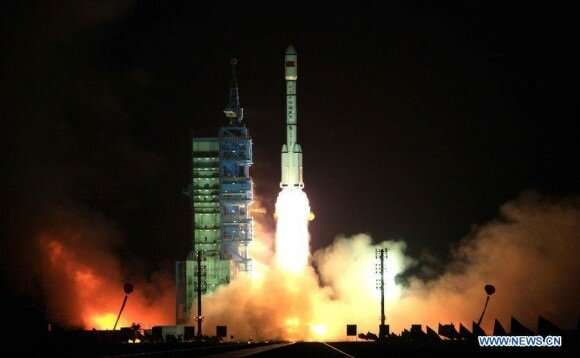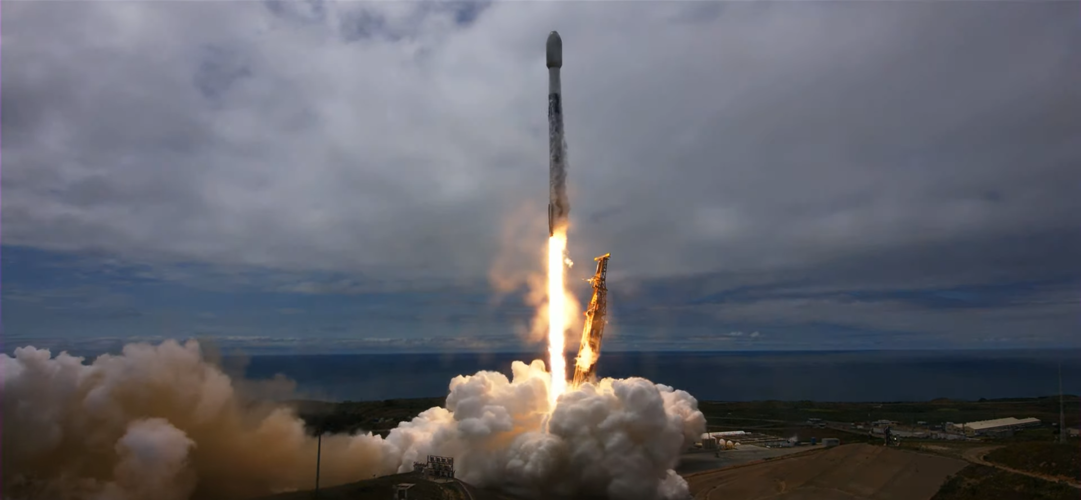
Copernical Team
China is trying to stop its boosters from randomly crashing into villages

China's space program has advanced by leaps and bounds in a relatively short time. However, it has suffered some bad publicity in recent years due to certain "uncontrolled reentries" (aka crashes). On multiple occasions, spent first stages have fallen back to Earth, posing a potential threat to populated areas and prompting backlash from NASA and the ESA, who claimed China was taking "unnecessary risks." To curb the risk caused by spent first stages, China has developed a parachute system that can guide fallen rocket boosters to predetermined landing zones.
According to the Chinese Academy of Launch Vehicle Technology (CALT), which developed the system, the system was successfully tested on a Long March-3B (CZ-3B) rocket on Friday, June 9th. As they indicated in their statement, a review of the test data and an in-situ analysis of the debris showed that the parachute system helped narrow the range of the landing area by 80%.
Nanosats launched that use light to talk

A second pair of satellites that use light to communicate with each other has been launched.
What's the dark matter with Euclid
 Euclid is ESA's mission to shed light on dark matter and dark energy, but teams at the Agency's mission control centre in Darmstadt, Germany, are also in the dark. A series of problems have befallen the mission in pre-launch simulations.
Currently about halfway through the Euclid simulations campaign, the key focus in the Main Control Room is the Launch and Early Orbit Phase (LEOP) and spa
Euclid is ESA's mission to shed light on dark matter and dark energy, but teams at the Agency's mission control centre in Darmstadt, Germany, are also in the dark. A series of problems have befallen the mission in pre-launch simulations.
Currently about halfway through the Euclid simulations campaign, the key focus in the Main Control Room is the Launch and Early Orbit Phase (LEOP) and spa New keen-sighted satellite will view distant stars, assist Webb telescope
 NASA's James Webb Space Telescope (JWST), the most powerful telescope ever launched into space, will soon get a new "sidekick"-a small but nimble satellite that borrows its name from a multicolored sea creature.
Last month, NASA selected the $8.5 million space mission, which is called Monitoring Activity from Nearby sTars with uv Imaging and Spectroscopy (MANTIS). This "CubeSat," or mini-s
NASA's James Webb Space Telescope (JWST), the most powerful telescope ever launched into space, will soon get a new "sidekick"-a small but nimble satellite that borrows its name from a multicolored sea creature.
Last month, NASA selected the $8.5 million space mission, which is called Monitoring Activity from Nearby sTars with uv Imaging and Spectroscopy (MANTIS). This "CubeSat," or mini-s USTC reveals reconfiguration process of solar eruptions
 Recently, a research team led by Prof. GOU Yanyu from the University of Science and Technology of China (USTC) of the Chinese Academy of Sciences (CAS) found that the solar outburst structure undergoes a complex reconfiguration evolution during the early outbursts, thus making important advances in the study of solar outburst activity. This study was published in Nature Astronomy.
In class
Recently, a research team led by Prof. GOU Yanyu from the University of Science and Technology of China (USTC) of the Chinese Academy of Sciences (CAS) found that the solar outburst structure undergoes a complex reconfiguration evolution during the early outbursts, thus making important advances in the study of solar outburst activity. This study was published in Nature Astronomy.
In class Astrobotic and Westinghouse team to power outer space
 At the 2023 Keystone Space Conference last week, Westinghouse Electric Company and Astrobotic announced the signing of a Memorandum of Understanding to explore collaboration on space technology programs for NASA and the Department of Defense.
The collaboration will focus on the development of space nuclear technology and delivery systems. The joint effort will also include strengthening th
At the 2023 Keystone Space Conference last week, Westinghouse Electric Company and Astrobotic announced the signing of a Memorandum of Understanding to explore collaboration on space technology programs for NASA and the Department of Defense.
The collaboration will focus on the development of space nuclear technology and delivery systems. The joint effort will also include strengthening th Thales Alenia Space joins tema to develop Destination Earth core service platform
 Thales Alenia Space, the joint venture between Thales (67%) and Leonardo (33%), will partner with Serco, the leader of the consortium awarded by the European Space Agency (ESA) to implement the DestinE Core Service Platform (DESP), a key element of the European Commission's flagship initiative Destination Earth (DestinE).
The objective of DestinE is to develop a highly accurate digital mod
Thales Alenia Space, the joint venture between Thales (67%) and Leonardo (33%), will partner with Serco, the leader of the consortium awarded by the European Space Agency (ESA) to implement the DestinE Core Service Platform (DESP), a key element of the European Commission's flagship initiative Destination Earth (DestinE).
The objective of DestinE is to develop a highly accurate digital mod Space Systems Command preps for West coast launch of 3 experimental satellites
 Space Systems Command (SSC)'s Space Domain Awareness and Combat Power (SDA&CP), is preparing to launch the Space Test Program (STP)-CR2301 mission to deliver three experimental satellites to Low Earth Orbit (LEO).
The STP-CR2301 mission, in partnership with the Air Force Research Laboratory (AFRL) and the Department of Defense (DoD) is scheduled to launch June 12 from Space Launch Complex
Space Systems Command (SSC)'s Space Domain Awareness and Combat Power (SDA&CP), is preparing to launch the Space Test Program (STP)-CR2301 mission to deliver three experimental satellites to Low Earth Orbit (LEO).
The STP-CR2301 mission, in partnership with the Air Force Research Laboratory (AFRL) and the Department of Defense (DoD) is scheduled to launch June 12 from Space Launch Complex Unveiling quantum gravity: New results from IceCube and Fermi data
 In a study published in Nature Astronomy, a team of researchers from the University of Naples "Federico II", the University of Wroclaw, and the University of Bergen examined a quantum-gravity model of particle propagation in which the speed of ultrarelativistic particles decreases with rising energy.
This effect is expected to be extremely small, proportional to the ratio between particle
In a study published in Nature Astronomy, a team of researchers from the University of Naples "Federico II", the University of Wroclaw, and the University of Bergen examined a quantum-gravity model of particle propagation in which the speed of ultrarelativistic particles decreases with rising energy.
This effect is expected to be extremely small, proportional to the ratio between particle Settling the guidelines to cover the entire life cycle of satellites
 In a significant step towards sustainable satellite production and operation, microsatellite pioneer Axelspace Corporation has announced the establishment of the "Green Spacecraft Standard 1.0." This new guideline is aimed at ensuring that the satellite lifecycle adheres to environmentally-friendly practices, in a bid to make sustainable operations the norm within the space industry.
This
In a significant step towards sustainable satellite production and operation, microsatellite pioneer Axelspace Corporation has announced the establishment of the "Green Spacecraft Standard 1.0." This new guideline is aimed at ensuring that the satellite lifecycle adheres to environmentally-friendly practices, in a bid to make sustainable operations the norm within the space industry.
This 